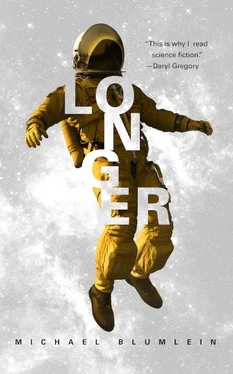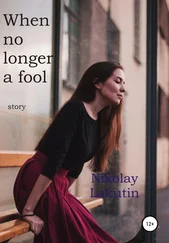Not everyone was so prudent.
He’d once had a patient who, first juve, had his vision enhanced. Ponied up, took the risk. The result was beyond his wildest expectations. What he saw, in his words, was “unbelievable,” “indescribable,” “kaleidoscopic” … and “nonstop.” He couldn’t turn his eyeballs off. Closed his lids, and the film kept running: real images, synthetic images, phantom ones, his retina working ’round the clock. An embarrassment of riches, a bombardment, an enfilade, until at length he lost his sight. Couldn’t see a thing. Blinded by extravagance and overabundance.
Had no choice but to swap his retina out for a new one: standard issue, boilerplate, unenhanced. Solved half the problem. Sought out Dashaud to solve the other half, which rested not in his eyes but in the brain behind them—the optic nerve, geniculate bodies, and visual cortex—which had also been damaged by overuse. These were the source of the ghost and phantom images, the hallucinatory misinformation and random visual events. Their repair involved some extremely delicate surgery, which Dashaud happened to be doing at the time.
He no longer did this surgery. There was less and less brain surgery being done all the time. Less surgery all around. More bio interventions, letting cells and parts of cells do the repair and cleanup themselves.
Surgeons were a dying breed.
About time, some people said. Dinosaurs. Butchers.
Until you needed one.
The good ones still had work. Still had a place.
Dashaud Mikelson was a good one. And now better than ever.
But not if he blew out his sense of touch. Who would come to a surgeon whose fingers were numb?
He slipped his gloves back on.
The inner glove was made of Pakkiflex, [2] Robert Fairchild and Julian Taborz’s brainchild accounted for 38 percent of the global market in responsive sheathing material. Current data compiled and reported by Blumlein et al, in The Roberts: A Twenty-Year Follow-Up.
and was like a second skin. The outer glove was leather: tough and grained. He resumed his climb, secure in the knowledge his hands were protected. He planned to summit, then take the backside down, which was a longer route, but more gently sloped. Descending the cliff itself would be quicker but dangerous.
The lone fulmar reappeared, and dove at him, coming close to impaling his head before veering off. It squawked and dove again, hovered, then deposited itself on a nearby rock, and proceeded to read him the riot act. He soon discovered why.
Huddling in a shallow saucer of grass was another fulmar. A male, and obviously unwell.
He stopped immediately, crouched down, and held that position. The female fulmar squawked, flapped its wings, and shifted uneasily. The male made not a peep. Its eyes were clamped shut. It was shivering.
Dashaud removed his gloves and inched a hand toward the bird. He felt vibrations in the air before even touching the creature. He felt much more when he laid his palm gently on its back: a huffing and puffing, an ebb and flow, a back and forth, but something more purposeful, too, like a tug-of-war, with life on one side, death on the other. Death appeared to have the upper hand.
Instinctively, he enfolded the trembling bird in his palms.
Its mate eyed him uneasily.
Fulmars mated for life. If the male died, the female would be a widow. Her mate’s death would be the signal; she’d know widowhood by the presence of his lifeless body. If Dashaud took him away in an effort to save him, she’d have a widow’s life without knowing how or why. Without certainty. She might wonder: was he still alive? Doubt might gnaw at her peanut-sized brain.
A gnawed-at brain, whatever the size, was the source of countless troubles. Dashaud had taken a solemn oath to cause as few as possible. He could leave the dying bird, and let nature take its course. Finish his climb, his ambition since childhood. He could see the summit from where he crouched.
Any hope of saving the poor creature rested on doing something soon. He peered down the way he’d come: the face was nearly sheer, the drop hundreds of feet and precipitous. It had been steep getting up, but it would be steeper going down. Always steeper and riskier descending.
He loved life. How could you not? And fulmars were plentiful.
What should he do?
He thought of Cav, his friend and mentor, whom he admired above all men, and would soon be seeing in the flesh. Cav would be slow to intervene. He would wait and observe.
He was waiting now. For what, he wasn’t sure.
“A sign? An epiphany?”
They had spoken not two days earlier. Pleased to hear from his orbiting pal, Dashaud had become concerned when the conversation took a turn.
A dark one, in his opinion. Suicide was dark.
“You’re depressed,” he said. It was the first thing that came into his head.
Cav considered this. “Am I? I don’t feel depressed. I feel quite sane.”
“You want to end your life prematurely. You want to do something totally unnecessary. And not just unnecessary, but damaging. Hurtful. Harmful. How can that be sane?”
“It’s my life,” said Cav.
“You took an oath to do no harm.”
“It’s a paradox, isn’t it? A thorny riddle.”
“It’s not a riddle at all.”
“A dilemma then.”
“No harm includes no harm to yourself.”
“Does it? I’m not so sure. And what constitutes harm? What I’m contemplating feels more positive. More an acknowledgement. An acceptance.”
“You ask too many questions. You spin them out of thin air. You love to stir things up.”
“I’m a troublemaker?”
“Yes.”
“But am I crazy? That’s the question. Tell me the truth.”
Dashaud had no trouble with this. “Yes.”
“In what way? Be precise.”
“You’re bullheaded. Argumentative. You love to provoke. You go off on tangents.”
“Guilty as charged. But crazy?”
“You make me crazy.”
Cav grinned. “It’s good to see you, my friend.”
“Likewise. Though I’m not thrilled with the circumstances. Please tell me it’s just talk.”
Cav deflected the question. Enough for now. “You juved.”
“You knew I was going to.”
“How was it?”
“Not bad. Fine. Easy.” Not true, but considering the topic of conversation, Cav hardly needed to hear it. “I feel good.”
“You look good.”
“You look old.”
“I am.”
“How’s your ticker?”
Cav shrugged.
“It could be brand new.”
“Understood. And then?”
“Sixty more years,” said Dashaud.
“Of what? Doing the same thing over again. Looking in the same mirror day after day. You reach a point of diminishing returns.”
“Not my experience.”
“True nonetheless.”
“That’s possible. Also possible: you’re full of it.”
“I’m not afraid of dying,” said Cav.
Dashaud was neither surprised nor particularly impressed. He’d seen his share of dying; his line of work guaranteed he’d see more. More men and women who met death fearfully, but many more than that who, for better or worse, welcomed it.
“Good for you,” he replied. “But this isn’t about that. It’s about taking your life.”
“It’s about taking control of my life.”
“By committing suicide.”
“By letting nature run its course.”
“You know something, Cav?”
“What’s that?”
“I hate talking to you.”
Cav threw up his hands. “I understand completely. I get tired of listening to myself. Days go by when the only thing I wish for is silence.”
To Dashaud, an ominous choice of word. “Do you have an actual plan?”
“A number.”
“Seriously?”
Читать дальше











